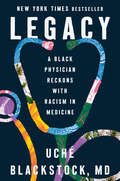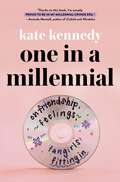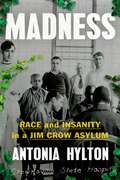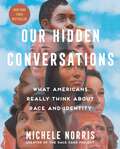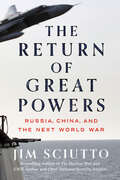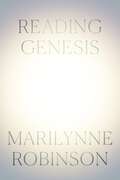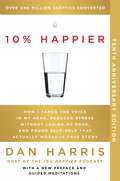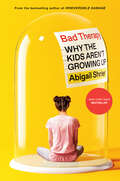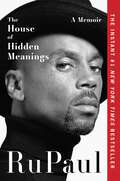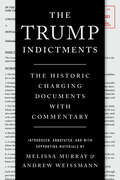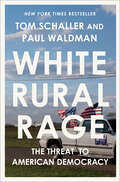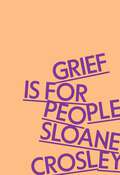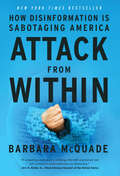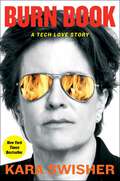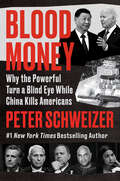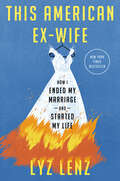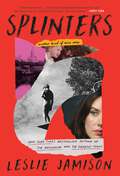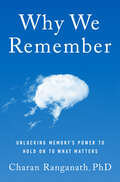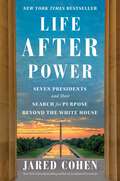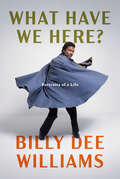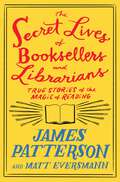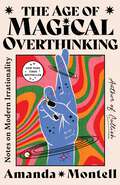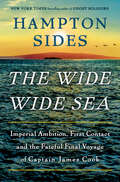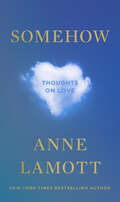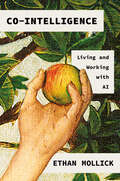Special Collections
New York Times Best Sellers - Non-Fiction
Description: Bookshare is pleased to offer the top 10 non-fiction books from the New York Times best seller list on a weekly basis. Books are added in as they become available. The month corresponds to the first time they appeared on the list. #adults
- Table View
- List View
Legacy
by Uché BlackstockAN INSTANT NEW YORK TIMES BESTSELLER&“This book is more than a memoir—it also serves as a call to action to create a more equitable healthcare system for patients of color, particularly Black women.&” —Essence One of NPR&’s 11 Books to Look Forward to in 2024 One of Good Morning America&’s 15 New Books to Read for the New Year &“Legacy is both a compelling memoir and an edifying analysis of the inequities in the way we deliver healthcare in America. Uché Blackstock is a force of nature.&” —Abraham Verghese, MD, New York Times bestselling author of The Covenant of Water &“[An] extraordinary family story.&” —Dr. Damon Tweedy, The New York Times Book Review &“This book should be required reading for all medical students.&” —Gayle King, CBS Mornings The rousing, captivating story of a Black physician, her career in medicine, and the deep inequities that still exist in the U.S. healthcare systemGrowing up in Brooklyn, New York, it never occurred to Uché Blackstock and her twin sister, Oni, that they would be anything but physicians. In the 1980s, their mother headed an organization of Black women physicians, and for years the girls watched these fiercely intelligent women in white coats tend to their patients and neighbors, host community health fairs, cure ills, and save lives.What Dr. Uché Blackstock did not understand as a child—or learn about at Harvard Medical School, where she and her sister had followed in their mother&’s footsteps, making them the first Black mother-daughter legacies from the school—were the profound and long-standing systemic inequities that mean just 2 percent of all U.S. physicians today are Black women; the racist practices and policies that ensure Black Americans have far worse health outcomes than any other group in the country; and the flawed system that endangers the well-being of communities like theirs. As an ER physician, and later as a professor in academic medicine, Dr. Blackstock became profoundly aware of the systemic barriers that Black patients and physicians continue to face.Legacy is a journey through the critical intersection of racism and healthcare. At once a searing indictment of our healthcare system, a generational family memoir, and a call to action, Legacy is Dr. Blackstock&’s odyssey from child to medical student to practicing physician—to finally seizing her own power as a health equity advocate against the backdrop of the pandemic and the Black Lives Matter movement.
One in a Millennial
by Kate KennedyFrom pop culture podcaster and a voice of a generation, Kate Kennedy, a celebration of the millennial zeitgeist
One In a Millennial is an exploration of pop culture, nostalgia, the millennial zeitgeist, and the life lessons learned (for better and for worse) from coming of age as a member of a much-maligned generation.
Kate is a pop culture commentator and host of the popular millennial-focused podcast Be There in Five. Part-funny, part-serious, Kate navigates the complicated nature of celebrating and criticizing the culture that shaped her as a woman, while arguing that great depths can come from surface-level interests.
With her trademark style and vulnerability, One In a Millennial is sharp, hilarious, and heartwarming all at once. She tackles AOL Instant Messenger, purity culture, American Girl Dolls, going out tops, Spice Girl feminism, her feelings about millennial motherhood, and more. Kate’s laugh-out-loud asides and keen observations will have you nodding your head and maybe even tearing up.
New York Times Bestseller
Madness
by Antonia HyltonOn a cold day in March of 1911, officials marched twelve Black men into the heart of a forest in Maryland. Under the supervision of a doctor, the men were forced to clear the land, pour cement, lay bricks, and harvest tobacco. When construction finished, they became the first twelve patients of the state’s Hospital for the Negro Insane. For centuries, Black patients have been absent from our history books. Madness transports readers behind the brick walls of a Jim Crow asylum.
In Madness, Peabody and Emmy award-winning journalist Antonia Hylton tells the 93-year-old history of Crownsville Hospital, one of the last segregated asylums with surviving records and a campus that still stands to this day in Anne Arundel County, Maryland. She blends the intimate tales of patients and employees whose lives were shaped by Crownsville with a decade-worth of investigative research and archival documents. Madness chronicles the stories of Black families whose mental health suffered as they tried, and sometimes failed, to find safety and dignity. Hylton also grapples with her own family’s experiences with mental illness, and the secrecy and shame that it reproduced for generations.
As Crownsville Hospital grew from an antebellum-style work camp to a tiny city sitting on 1,500 acres, the institution became a microcosm of America’s evolving battles over slavery, racial integration, and civil rights. During its peak years, the hospital’s wards were overflowing with almost 2,700 patients. By the end of the 20th-century, the asylum faded from view as prisons and jails became America’s new focus.
In Madness, Hylton traces the legacy of slavery to the treatment of Black people’s bodies and minds in our current mental healthcare system. It is a captivating and heartbreaking meditation on how America decides who is sick or criminal, and who is worthy of our care or irredeemable.
New York Times Bestseller
Our Hidden Conversations
by Michele NorrisPeabody Award–winning journalist Michele Norris offers a transformative dialogue on race and identity in America, unearthed through her decade-long work at The Race Card Project.
The prompt seemed simple: Race. Your Thoughts. Six Words. Please Send.
The answers, though, have been challenging and complicated. In the twelve years since award-winning journalist Michele Norris first posed that question, over half a million people have submitted their stories to The Race Card Project inbox. The stories are shocking in their depth and candor, spanning the full spectrum of race, ethnicity, identity, and class. Even at just six words, the micro-essays can pack quite a punch, revealing, fear, pain, triumph, and sometimes humor. Responses such as: You’re Pretty for a Black girl. White privilege, enjoy it, earned it. Lady, I don’t want your purse. My ancestors massacred Indians near here. Urban living has made me racist. I’m only Asian when it’s convenient.
Many go even further than just six words, submitting backstories, photos, and heirlooms: a collection much like a scrapbook of American candor you rarely get to see. Our Hidden Conversationsis a unique compilation of stories, richly reported essays, and photographs providing a window into America during a tumultuous era. This powerful book offers an honest, if sometimes uncomfortable, conversation about race and identity, permitting us to eavesdrop on deep-seated thoughts, private discussions, and long submerged memories.
The breadth of this work came as a surprise to Norris. For most of the twelve years she has collected these stories, many were submitted by white respondents. This unexpected panorama provides a rare 360-degree view of how Americans see themselves and one another.
Our Hidden Conversations reminds us that even during times of great division, honesty, grace, and a willing ear can provide a bridge toward empathy and maybe even understanding.
New York Times Bestseller
The Return of Great Powers
by Jim SciuttoThe essential new book by CNN anchor and chief national security analyst Jim Sciutto, identifying a new, more uncertain global order with reporting on the frontlines of power from existing wars to looming ones across the globe.
The fall of the Berlin Wall in 1989 dawned what Francis Fukuyama called “The End of History.” Three decades later, Jim Sciutto said on CNN’s air as the Ukraine war began, that we are living in a “1939 moment.” History never ended—it barely paused—and the global order as we long have known it is now gone. Powerful nations are determined to assert dominance on the world stage. And as their push for power escalates, a new order will affect everyone across the globe. Russia’s invasion of Ukraine is a part of it, but in reality, this power struggle impacts every corner of our world—from Helsinki to Beijing, from Australia to the North Pole. This is a battle with many fronts: in the Arctic, in the oceans and across the skies, on man-made islands and redrawn maps, and in tech and cyberspace.
Through globe-spanning, exclusive interviews with dozens of political, military, and intelligence leaders, Sciutto defines our times as a return of great power conflict, “a definitive break between the post–Cold War era and an entirely new and uncertain one.” With savvy, thorough, in-person reporting, he follows-up his 2019 bestseller, The Shadow War: Inside Russia’s and China's Secret Operations to Defeat America, which focused on the covert tactics of a hidden conflict.
The Return of Great Powers analyzes a historic and visible shift in real time. It details the realities of this new post–post–Cold War era, the increasingly aligned Russian and Chinese governments, and the flashpoint of a new, global nuclear arms race. And it poses a question: As we consider uncertain, even terrifying, outcomes, will it be possible for the West and Russia and China to prevent a new World War?
New York Times Bestseller
Reading Genesis
by Marilynne RobinsonINSTANT NEW YORK TIMES BESTSELLEROne of our greatest novelists and thinkers presents a radiant, thrilling interpretation of the book of Genesis.For generations, the book of Genesis has been treated by scholars as a collection of documents by various hands, expressing different factional interests, with borrowings from other ancient literatures that mark the text as derivative. In other words, academic interpretation of Genesis has centered on the question of its basic coherency, just as fundamentalist interpretation has centered on the question of the appropriateness of reading it as literally true.Both of these approaches preclude an appreciation of its greatness as literature, its rich articulation and exploration of themes that resonate through the whole of Scripture. Marilynne Robinson’s Reading Genesis, which includes the full text of the King James Version of the book, is a powerful consideration of the profound meanings and promise of God’s enduring covenant with humanity. This magisterial book radiates gratitude for the constancy and benevolence of God’s abiding faith in Creation.
10% Happier
by Dan HarrisIn celebration of its 10th anniversary, a revised and updated edition of the award-winning #1 New York Times bestseller that changed the way we look at meditation, expanded with new material by Dan Harris.
After having a nationally televised panic attack on Good Morning America, Dan Harris knew he had to make some changes. A lifelong nonbeliever, he found himself on a bizarre adventure involving a disgraced pastor, a mysterious self-help guru, and a gaggle of brain scientists. Eventually, Harris realized that the source of his problems was the very thing he always thought was his greatest asset: the incessant, insatiable voice in his head.
We all have an inner narrator. It’s what has us losing our temper unnecessarily, checking our email compulsively, eating when we’re not hungry, and fixating on the past and the future at the expense of the present. Most of us assume we’re stuck with this voice—that there’s nothing we can do to rein it in—but Harris stumbled upon an effective way to do just that.
10% Happier is now considered a classic text on the power of meditation, an introduction to the practice that can convert even the most hardened skeptic. With over a million copies sold, 10% Happier is the go-to guide, and with meditation now a widely accepted and encouraged practice, Dan Harris is a pivotal and approachable figure in the field who has built a thriving platform based on the ideas he first presented in this book.
In this 10th Anniversary Edition, Harris offers a new preface reflecting on how much has changed—for him and for the public perceptions of meditation, plus a revised and expanded appendix, filled with guided meditations and practical advice for people looking to boot up a habit.
New York Times Bestseller
Bad Therapy
by Abigail ShrierFrom the author of Irreversible Damage, an investigation into a mental health industry that is harming, not healing, American children.
<>p> In virtually every way that can be measured, Gen Z’s mental health is worse than that of previous generations. Youth suicide rates are climbing, antidepressant prescriptions for children are common, and the proliferation of mental health diagnoses has not helped the staggering number of kids who are lonely, lost, sad and fearful of growing up. What’s gone wrong with America’s youth?
<>p> In Bad Therapy, bestselling investigative journalist Abigail Shrier argues that the problem isn’t the kids—it’s the mental health experts. Drawing on hundreds of interviews with child psychologists, parents, teachers, and young people, Shrier explores the ways the mental health industry has transformed the way we teach, treat, discipline, and even talk to our kids. She reveals that most of the therapeutic approaches have serious side effects and few proven benefits. Among her unsettling findings:
<>p> Talk therapy can induce rumination, trapping children in cycles of anxiety and depression Social Emotional Learning handicaps our most vulnerable children, in both public schools and private “Gentle parenting” can encourage emotional turbulence – even violence – in children as they lash out, desperate for an adult in charge.
<>p> Mental health care can be lifesaving when properly applied to children with severe needs, but for the typical child, the cure can be worse than the disease. Bad Therapy is a must-read for anyone questioning why our efforts to bolster America’s kids have backfired—and what it will take for parents to lead a turnaround.
New York Times Bestseller
The House of Hidden Meanings
by RuPaulFrom international drag superstar and pop culture icon RuPaul, comes his most revealing and personal work to date—a brutally honest, surprisingly poignant, and deeply intimate memoir of growing up Black, poor, and queer in a broken home to discovering the power of performance, found family, and self-acceptance. A profound introspection of his life, relationships, and identity, The House of Hidden Meanings is a self-portrait of the legendary icon on the road to global fame and changing the way the world thinks about drag.
Central to RuPaul’s success has been his chameleonic adaptability. From drag icon to powerhouse producer of one of the world’s largest television franchises, RuPaul’s ever-shifting nature has always been part of his brand as both supermodel and supermogul. Yet that adaptability has made him enigmatic to the public. In this memoir, his most intimate and detailed book yet, RuPaul makes himself truly known.
In The House of Hidden Meanings, RuPaul strips away all artifice and recounts the story of his life with breathtaking clarity and tenderness, bringing his signature wisdom and wit to his own biography. From his early years growing up as a queer Black kid in San Diego navigating complex relationships with his absent father and temperamental mother, to forging an identity in the punk and drag scenes of Atlanta and New York, to finding enduring love with his husband Georges LeBar and self-acceptance in sobriety, RuPaul excavates his own biography life-story, uncovering new truths and insights in his personal history.
Here in RuPaul’s singular and extraordinary story is a manual for living—a personal philosophy that testifies to the value of chosen family, the importance of harnessing what makes you different, and the transformational power of facing yourself fearlessly.
A profound introspection of his life, relationships, and identity, The House of Hidden Meanings is a self-portrait of the legendary icon on the road to global fame and changing the way the world thinks about drag. “I've always loved to view the world with analytical eyes, examining what lies beneath the surface. Here, the focus is on my own life—as RuPaul Andre Charles,” says RuPaul.
If we’re all born naked and the rest is drag, then this is RuPaul totally out of drag. This is RuPaul stripped bare.
New York Times Bestseller
The Trump Indictments
by Andrew Weissmann and Melissa MurrayCollecting the four unprecedented indictments against Donald Trump, this essential volume features extensive commentary by NYU law professors and MSNBC contributors Melissa Murray and Andrew Weissmann.
In the long span of American history, Donald Trump is the first former president to face criminal indictment. He is the subject of a series of explosive charges across four cases: the January 6 case brought by Special Counsel Jack Smith; the election interference case in Georgia; the classified documents case also brought by Special Counsel Jack Smith; and the "hush money" case in New York. The Trump Indictments includes: • An introduction offering historical background and international comparisons for criminal charges against a former political leader. • The four indictments with annotations throughout, including insider notes from an eminent scholar (Murray) and a former federal prosecutor (Weissmann). • A cast of characters, from Trump and his alleged co-conspirators to notable Proud Boys and Oath Keepers who face prison sentences as a result of related January 6 cases. • A timeline that brings together in one place the critical events that led to the four indictments. A necessary handbook for anyone following the trials in 2024, The Trump Indictments will endure as an indispensable record of a democracy at the crossroads.
New York Times Bestseller
White Rural Rage
by Paul Waldman and Tom SchallerA searing portrait and damning takedown of America’s proudest citizens—who are also the least likely to defend its core principles.
White rural voters hold the greatest electoral sway of any demographic group in the United States, yet rural communities suffer from poor healthcare access, failing infrastructure, and severe manufacturing and farming job losses. Rural voters believe our nation has betrayed them, and to some degree, they’re right. In White Rural Rage, Tom Schaller and Paul Waldman explore why rural Whites have failed to reap the benefits from their outsize political power and why, as a result, they are the most likely group to abandon democratic norms and traditions. Their rage—stoked daily by Republican politicians and the conservative media—now poses an existential threat to the United States.
Schaller and Waldman show how vulnerable U.S. democracy has become to rural Whites who, despite legitimate grievances, are increasingly inclined to hold racist and xenophobic beliefs, to believe in conspiracy theories, to accept violence as a legitimate course of political action, and to exhibit antidemocratic tendencies. Rural White Americans’ attitude might best be described as “I love my country, but not our country,” Schaller and Waldman argue. This phenomenon is the patriot paradox of rural America: The citizens who take such pride in their patriotism are also the least likely to defend core American principles. And by stoking rural Whites’ anger rather than addressing the hard problems they face, conservative politicians and talking heads create a feedback loop of resentments that are undermining American democracy.
Schaller and Waldman provocatively critique both the structures that permit rural Whites’ disproportionate influence over American governance and the prospects for creating a pluralist, inclusive democracy that delivers policy solutions that benefit rural communities. They conclude with a political reimagining that offers a better future for both rural people and the rest of America.
New York Times Bestseller
Grief Is for People
by Sloane CrosleyDisarmingly witty and poignant, Sloane Crosley’s memoir explores multiple kinds of loss following the death of her closest friend.
How do we live without the ones we love? Grief Is for People is a deeply moving and suspenseful portrait of friendship, and a book about loss that is profuse with life. Sloane Crosley is one of our most renowned observers of contemporary behavior, and now the pathos that has been ever present in her trademark wit is on full display. After the pain and confusion of losing her closest friend to suicide, Crosley looks for answers in philosophy and art, hoping for a framework more useful than the unavoidable stages of grief.
For most of her adult life, Sloane and Russell worked together and played together as they navigated the corridors of office life, the literary world, and the dramatic cultural shifts in New York City. One day, Sloane’s apartment is broken into. Along with her most prized possessions, the thief makes off with her sense of security, leaving a mystery in its place.
When Russell dies exactly one month later, his suicide propels Sloane on a wild quest to right the unrightable, to explore what constitutes family and possession as the city itself faces the staggering toll of the pandemic.
Sloane Crosley’s search for truth is frank, darkly funny, and gilded with resounding empathy. Upending the “grief memoir,” Grief Is for People is a category-defying story of the struggle to hold on to the past without being consumed by it. A modern elegy, it rises precisely to console and challenge our notions of mourning during these grief-stricken times.
New York Times Bestseller
Attack from Within
by Barbara McQuadeA NEW YORK TIMES BESTSELLERAn urgent, comprehensive explanation of the ways disinformation is impacting democracy, and practical solutions that can be pursued to strengthen the public, media, and truth-based politicsMSNBC's legal expert breaks down the ways disinformation has become a tool to drive voters to extremes, disempower our legal structures, and consolidate power in the hands of the few."One of the most acute observers of our time shares . . . a compelling work about a challenge that—left unexamined and left unchecked—could undermine our democracy." —Eric H. Holder Jr, 82nd Attorney General of the United StatesAmerican society is more polarized than ever before. We are strategically being pushed apart by disinformation—the deliberate spreading of lies disguised as truth—and it comes at us from all sides: opportunists on the far right, Russian misinformed social media influencers, among others. It's endangering our democracy and causing havoc in our electoral system, schools, hospitals, workplaces, and in our Capitol. Advances in technology including rapid developments in artificial intelligence threaten to make the problems even worse by amplifying false claims and manufacturing credibility.In Attack from Within, legal scholar and analyst Barbara McQuade, shows us how to identify the ways disinformation is seeping into all facets of our society and how we can fight against it. The book includes: The authoritarian playbook: a brief history of disinformation from Mussolini and Hitler to Bolsonaro and Trump, chronicles the ways in which authoritarians have used disinformation to seize and retain power.Disinformation tactics—like demonizing the other, seducing with nostalgia, silencing critics, muzzling the media, condemning the courts; stoking violence—and reasons why they work.An explanation of why America is particularly vulnerable to disinformation and how it exploits our First Amendment Freedoms, sparks threats and violence, and destabilizes social structures.Real, accessible solutions for countering disinformation and maintaining the rule of law such as making domestic terrorism a federal crime, increasing media literacy in schools, criminalizing doxxing, and much more.Disinformation is designed to evoke a strong emotional response to push us toward more extreme views, unable to find common ground with others. The false claims that led to the breathtaking attack on our Capitol in 2021 may have been only a dress rehearsal. Attack from Within shows us how to prevent it from happening again, thus preserving our country&’s hard-won democracy.
Burn Book
by Kara SwisherInstant New York Times Bestseller From award-winning journalist Kara Swisher comes a witty, scathing, but fair accounting of the tech industry and its founders who wanted to change the world but broke it instead. &“Swisher, the bad-ass journalist and OG chronicler of Silicon Valley…takes no prisoners in this highly readable look at the evolution of the digital world…Bawdy, brash, and compulsively thought-provoking, just like its author, Burn Book sizzles&” (Booklist, starred review).Part memoir, part history, Burn Book is a necessary chronicle of tech&’s most powerful players. From &“the queen of all media&” (Walt Mossberg, The Wall Street Journal), this is the inside story we&’ve all been waiting for about modern Silicon Valley and the biggest boom in wealth creation in the history of the world. When tech titans crowed that they would &“move fast and break things,&” Kara Swisher was moving faster and breaking news. While covering the explosion of the digital sector in the early 1990s, she developed a long track record of digging up and reporting the facts about this new world order. Her consistent scoops drove one CEO to accuse her of &“listening in the heating ducts&” and prompted Facebook&’s Sheryl Sandberg to once observe: &“It is a constant joke in the Valley when people write memos for them to say, &‘I hope Kara never sees this.&’&” While still in college, Swisher got her start at The Washington Post, where she became one of the few people in journalism interested in covering the nascent Internet. She went on to work for The Wall Street Journal, joining with Walt Mossberg to start the groundbreaking D: All Things Digital conference, as well as pioneering tech news sites. Swisher has interviewed everyone who matters in tech over three decades, right when they presided over an explosion of world-changing innovation that has both helped and hurt our world. Steve Jobs, Jeff Bezos, Elon Musk, Bill Gates, Sheryl Sandberg, Bob Iger, Larry Page and Sergey Brin, Meg Whitman, Peter Thiel, Sam Altman, and Mark Zuckerberg are just a few whom Swisher made sweat—figuratively and, in Zuckerberg&’s case, literally. Despite the damage she chronicles, Swisher remains optimistic about tech&’s potential to help solve problems and not just create them. She calls upon the industry to make better, more thoughtful choices, even as a new set of powerful AI tools are poised to change the world yet again. At its heart, this book is a love story to, for, and about tech from someone who knows it better than anyone.
Blood Money
by Peter SchweizerIt’s often said that China is in a cold war with America. The reality is far worse: the war is hot, and the body count is one-sided.
China is killing Americans and working aggressively to maximize the carnage while our leaders remain passive and, in some cases, compliant. Why?
If anyone could crack the code, it’s the renowned nonpartisan investigator Peter Schweizer. Schweizer’s previous three number one New York Times bestsellers sent shock waves through official Washington, sparking FBI investigations and congressional probes that continue to this day.
For Blood Money, Schweizer and his team of forensic investigators spent more than two years scouring a trove of restricted Chinese military documents, data-mining a mountain of American financial records, and tracking US political leaders’ investments and family businesses. Schweizer unloads bombshell after bombshell, exposing the Chinese Communist Party’s covert operations in the American drug trade, social justice movement, and medical establishment to sow chaos and decadence in the United States.
A towering achievement of investigative journalism, Blood Money is one of those rare books that makes you clearly see the world anew.
New York Times Bestseller
This American Ex-Wife
by Lyz LenzA deeply validating manifesto on the gender politics of marriage (bad) and divorce (actually pretty good!) in America today, and an argument that the former needs a reboot—from journalist and proud divorcée Lyz Lenz
Studies show that nearly 70 percent of divorces are initiated by women—women who are tired, fed up, exhausted, and unhappy. We’ve all seen how the media portrays divorcées: sad, lonely, drowning their sorrows in a bottle of wine. Lyz Lenz is one such woman whose life fell apart after she reached a breaking point in her twelve-year marriage. But she refused to take part in that tired narrative and decided to flip the script on divorce.
In this exuberant and unapologetic book, Lenz makes an argument for the advantages of getting divorced, framing it as a practical and effective solution for women to take back the power they are owed. Weaving reportage with sociological research and literature with popular culture along with personal stories of coming together and breaking up, Lenz creates a kaleidoscopic and poignant portrait of American marriage today. She argues that the mechanisms of American power, justice, love, and gender equality remain deeply flawed, and that marriage, like any other cultural institution, is due for a reckoning. A raucous argument for acceptance, solidarity, and collective female refusal, This American Ex-Wife takes readers on a riveting ride—while pointing us all toward a life that is a little more free.
New York Times Bestseller
Splinters
by Leslie JamisonLeslie Jamison has become one of our most beloved contemporary voices, a scribe of the real, the true, the complex. She has been compared to Joan Didion and Susan Sontag, acclaimed for her powerful thinking, deep feeling, and electric prose. But while Jamison has never shied away from challenging material—scouring her own psyche and digging into our most unanswerable questions across four books—Splinters enters a new realm.
In her first memoir, Jamison turns her unrivaled powers of perception on some of the most intimate relationships of her life: her consuming love for her young daughter, a ruptured marriage once swollen with hope, and the shaping legacy of her own parents’ complicated bond. In examining what it means for a woman to be many things at once—a mother, an artist, a teacher, a lover—Jamison places the magical and the mundane side by side in surprising ways. The result is a work of nonfiction like no other, an almost impossibly deep reckoning with the muchness of life and art, and a book that grieves the departure of one love even as it celebrates the arrival of another.
How do we move forward into joy when we are haunted by loss? How do we claim hope alongside the harm we’ve caused? A memoir for which the very term tour de force seems to have been coined, Splinters plumbs these and other pressing questions with writing that is revelatory to the last page, full of linguistic daring and emotional acuity.
New York Times Bestseller
Why We Remember
by Charan RanganathMemory is far more than a record of the past. In this groundbreaking tour of the mind and brain, one of the world’s top memory researchers reveals the powerful role memory plays in nearly every aspect of our lives, from recalling faces and names, to learning, decision-making, trauma and healing.
“Prominent neuroscientist and Guggenheim Fellow Charan Ranganath guides us through the science of our memories with incredible insight and clear science. He combines fascinating tales of the peculiarities of memory with practical, actionable steps. Not only will every reader remember better afterward, they’ll also never forget this life-changing book.” —Siddhartha Mukherjee, Pulitzer Prize-winning author of The Emperor of Maladies and Gene
A new understanding of memory is emerging from the latest scientific research. In Why We Remember, pioneering neuroscientist and psychologist Charan Ranganath radically reframes the way we think about the everyday act of remembering. Combining accessible language with cutting-edge research, he reveals the surprising ways our brains record the past and how we use that information to understand who we are in the present, and to imagine and plan for the future.
Memory, Dr. Ranganath shows, is a highly transformative force that shapes how we experience the world in often invisible and sometimes destructive ways. Knowing this can help us with daily remembering tasks, like finding our keys, and with the challenge of memory loss as we age. What’s more, when we work with the brain’s ability to learn and reinterpret past events, we can heal trauma, shed our biases, learn faster, and grow in self-awareness.
Including fascinating studies and examples from pop culture, and drawing on Ranganath’s life as a scientist, father, and child of immigrants, Why We Remember is a captivating read that unveils the hidden role memory plays throughout our lives. When we understand its power– and its quirks–we can cut through the clutter and remember the things we want to remember. We can make freer choices and plan a happier future.
New York Times Bestseller
Life After Power
by Jared CohenNew York Times Bestseller New York Times bestselling author of Accidental Presidents explores what happens after the most powerful job in the world: President of the United States.Former presidents have an unusual place in American life. King George III believed that George Washington&’s departure after two terms made him &“the greatest character of the age.&” But Alexander Hamilton worried former presidents might &“[wander] among the people like ghosts.&” They were both right. Life After Power tells the stories of seven former presidents, from the Founding to today. Each changed history. Each offered lessons about how to decide what to do in the next chapter of life. Thomas Jefferson was the first former president to accomplish great things after the White House, shaping public debates and founding the University of Virginia, an accomplishment he included on his tombstone, unlike his presidency. John Quincy Adams served in Congress and became a leading abolitionist, passing the torch to Abraham Lincoln. Grover Cleveland was the only president in American history to serve a nonconsecutive term. William Howard Taft became Chief Justice of the Supreme Court. Herbert Hoover shaped the modern conservative movement, led relief efforts after World War II, reorganized the executive branch, and reconciled John F. Kennedy and Richard Nixon. Jimmy Carter had the longest post-presidency in American history, advancing humanitarian causes, human rights, and peace. George W. Bush made a clean break from politics, bringing back George Washington&’s precedent, and reminding the public that the institution of the presidency is bigger than any person. Jared Cohen explores the untold stories in the final chapters of these presidents&’ lives, offering a gripping and illuminating account of how they went from President of the United States one day, to ordinary citizens the next. He tells how they handled very human problems of ego, finances, and questions about their legacy and mortality. He shows how these men made history after they left the White House.
What Have We Here?
by Billy Dee WilliamsA film legend recalls his remarkable life of nearly eight decades—a heralded actor who's played the roles he wanted, from Brian’s Song to Lando in the Star Wars universe—unchecked by the racism and typecasting so rife in the mostly all-white industry in which he triumphed.
Billy Dee Williams was born in Harlem in 1937 and grew up in a household of love and sophistication. As a young boy, he made his stage debut working with Lotte Lenya in an Ira Gershwin/Kurt Weill production where Williams ended up feeding Lenya her lines. He studied painting, first at the High School of Music and Art, with fellow student Diahann Carroll, and then at the National Academy of Fine Art, before setting out to pursue acting with Herbert Berghoff, Stella Adler, and Sidney Poitier.
His first film role was in The Last Angry Man, the great Paul Muni’s final film. It was Muni who gave Billy the advice that sent him soaring as an actor, “You can play any character you want to play no matter who you are, no matter the way you look or the color of your skin.” And Williams writes, “I wanted to be anyone I wanted to be.”
He writes of landing the role of a lifetime: co-starring alongside James Caan in Brian’s Song, the made-for-television movie that was watched by an audience of more than fifty million people. Williams says it was “the kind of interracial love story America needed.”
And when, as the first Black character in the Star Wars universe, he became a true pop culture icon, playing Lando Calrissian in George Lucas’s The Empire Strikes Back (“What I presented on the screen people didn’t expect to see”). It was a role he reprised in the final film of the original trilogy, The Return of the Jedi, and in the recent sequel The Rise of Skywalker.
A legendary actor, in his own words, on all that has sustained and carried him through a lifetime of dreams and adventure.
New York Times Bestseller
The Secret Lives of Booksellers and Librarians
by James Patterson and Matt EversmannTo be a bookseller or librarian…
You have to play detective.
Be a treasure hunter. A matchmaker. An advocate. A visionary.
A person who creates “book joy” by pulling a book from a shelf, handing it to someone and saying, “You’ve got to read this. You’re going to love it.”
Step inside The Secret Lives of Booksellers and Librarians and enter a world where you can feed your curiosities, discover new voices, find whatever you want or require. This place has the magic of rainbows and unicorns, but it's also a business. The book business.
Meet the smart and talented people who live between the pages—and who can’t wait to help you find your next favorite book.
New York Times Bestseller
The Age of Magical Overthinking
by Amanda MontellINSTANT NEW YORK TIMES BESTSELLER From the bestselling author of Cultish and host of the podcast Sounds Like a Cult, a delicious blend of cultural criticism and personal narrative that explores our cognitive biases and the power, disadvantages, and highlights of magical thinking. Utilizing the linguistic insights of her &“witty and brilliant&” (Blyth Roberson, author of America the Beautiful?) first book Wordslut and the sociological explorations of her breakout hit Cultish, Amanda Montell now turns her erudite eye to the inner workings of the human mind and its biases in her most personal and electrifying work yet. &“Magical thinking&” can be broadly defined as the belief that one&’s internal thoughts can affect unrelated events in the external world: think of the conviction that one can manifest their way out of poverty, stave off cancer with positive vibes, thwart the apocalypse by learning to can their own peaches, or transform an unhealthy relationship to a glorious one with loyalty alone. In all its forms, magical thinking works in service of restoring agency amid chaos, but in The Age of Magical Overthinking, Montell argues that in the modern information age, our brain&’s coping mechanisms have been overloaded, and our irrationality turned up to an eleven. In a series of razor sharp, deeply funny chapters, Montell delves into a cornucopia of the cognitive biases that run rampant in our brains, from how the &“halo effect&” cultivates worship (and hatred) of larger-than-life celebrities, to how the &“sunk cost fallacy&” can keep us in detrimental relationships long after we&’ve realized they&’re not serving us. As she illuminates these concepts with her signature brilliance and wit, Montell&’s prevailing message is one of hope, empathy, and ultimately forgiveness for our anxiety-addled human selves. If you have all but lost faith in our ability to reason, Montell aims to make some sense of the senseless. To crack open a window in our minds, and let a warm breeze in. To help quiet the cacophony for a while, or even hear a melody in it.
The Wide Wide Sea
by Hampton SidesOn July 12th, 1776, Captain James Cook, already lionized as the greatest explorer in British history, set off on his third voyage in his ship the HMS Resolution. Two-and-a-half years later, on a beach on the island of Hawaii, Cook was killed in a conflict with native Hawaiians. How did Cook, who was unique among captains for his respect for Indigenous peoples and cultures, come to that fatal moment?
Hampton Sides’ bravura account of Cook’s last journey both wrestles with Cook’s legacy and provides a thrilling narrative of the titanic efforts and continual danger that characterized exploration in the 1700s. Cook was renowned for his peerless seamanship, his humane leadership, and his dedication to science-–the famed naturalist Joseph Banks accompanied him on his first voyage, and Cook has been called one of the most important figures of the Age of Enlightenment. He was also deeply interested in the native people he encountered. In fact, his stated mission was to return a Tahitian man, Mai, who had become the toast of London, to his home islands. On previous expeditions, Cook mapped huge swaths of the Pacific, including the east coast of Australia, and initiated first European contact with numerous peoples. He treated his crew well, and endeavored to learn about the societies he encountered with curiosity and without judgment.
Yet something was different on this last voyage. Cook became mercurial, resorting to the lash to enforce discipline, and led his two vessels into danger time and again. Uncharacteristically, he ordered violent retaliation for perceived theft on the part of native peoples. This may have had something to do with his secret orders, which were to chart and claim lands before Britain’s imperial rivals could, and to discover the fabled Northwest Passage. Whatever Cook’s intentions, his scientific efforts were the sharp edge of the colonial sword, and the ultimate effects of first contact were catastrophic for Indigenous people around the world. The tensions between Cook’s overt and covert missions came to a head on the shores of Hawaii. His first landing there was harmonious, but when Cook returned after mapping the coast of the Pacific Northwest and Alaska, his exploitative treatment of the Hawaiians led to the fatal encounter.
At once a ferociously-paced story of adventure on the high seas and a searching examination of the complexities and consequences of the Age of Exploration, THE WIDE WIDE SEA is a major work from one of our finest narrative nonfiction writers.
New York Times Bestseller
Somehow
by Anne Lamott“Love is our only hope,” Anne Lamott writes in this perceptive new book. “It is not always the easiest choice, but it is always the right one, the noble path, the way home to safety, no matter how bleak the future looks.”
In Somehow: Thoughts on Love, Lamott explores the transformative power that love has in our lives: how it surprises us, forces us to confront uncomfortable truths, reminds us of our humanity, and guides us forward. “Love just won’t be pinned down,” she says. “It is in our very atmosphere” and lies at the heart of who we are. We are, Lamott says, creatures of love.
In each chapter of Somehow, Lamott refracts all the colors of the spectrum. She explores the unexpected love for a partner later in life. The bruised (and bruising) love for a child who disappoints, even frightens. The sustaining love among a group of sinners, for a community in transition, in the wider world. The lessons she underscores are that love enlightens as it educates, comforts as it energizes, sustains as it surprises.
Somehow is Anne Lamott’s twentieth book, and in it she draws from her own life and experience to delineate the intimate and elemental ways that love buttresses us in the face of despair as it galvanizes us to believe that tomorrow will be better than today. Full of the compassion and humanity that have made Lamott beloved by millions of readers, Somehow is classic Anne Lamott: funny, warm, and wise.
Co-Intelligence
by Ethan MollickFrom Wharton professor and author of the popular One Useful Thing Substack newsletter Ethan Mollick comes the definitive playbook for working, learning, and living in the new age of AI
Something new entered our world in November 2022 — the first general purpose AI that could pass for a human and do the kinds of creative, innovative work that only humans could do previously. Wharton professor Ethan Mollick immediately understood what ChatGPT meant: after millions of years on our own, humans had developed a kind of co-intelligence that could augment, or even replace, human thinking. Through his writing, speaking, and teaching, Mollick has become one of the most prominent and provocative explainers of AI, focusing on the practical aspects of how these new tools for thought can transform our world.
In Co-Intelligence, Mollick urges us to engage with AI as co-worker, co-teacher, and coach. He assesses its profound impact on business and education, using dozens of real-time examples of AI in action. Co-Intelligence shows what it means to think and work together with smart machines, and why it’s imperative that we master that skill.
Mollick challenges us to utilize AI’s enormous power without losing our identity, to learn from it without being misled, and to harness its gifts to create a better human future. Wide ranging, hugely thought-provoking, optimistic, and lucid, Co-Intelligence reveals the promise and power of this new era.
New York Times Bestseller
